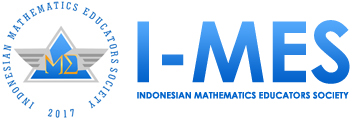MISCONCEPTIONS IN LEARNING GROUP THEORY : CASE STUDY PRE-SERVICE MATHEMATIC TEACHERS
Abstract
This study aims to explore the misconceptions that occur in group theory learning conducted by pre-service mathematic teachers. This research is part of a long research from abstraction in learning group theory: study of hermeneutic phenomenology on pre-service mathematics teachers. This research method uses case study in qualitative research. Data obtained in the form of Focus Group Discussion (FGD) videos and pdf files of partisipan diaries. The findings of this study indicate a misconception on group as set and subset as subgroup and on the inverse element as only one over in multiplication. These two misconceptions show from misunderstanding and misperseption.
Full Text:
PDFReferences
G. Harel, “What is Mathematics? A Pedagogical Answer to a Philosophical Question,†in Proof and Other Dilemmas : Mathematics and Philosophy, B. Gold dan R. A. Simons, Ed. Washington: The Mathematical Association of America, 2008, hal. 265–290.
E. Fischbein, “The Interaction between the Formal, the Algorithmic and the Intuitive Components in a Mathematical Activity,†in Didactics of Mathematics as a Scientific Discipline, New York, Boston, Dordrecht, London, Moscow: Kluwer Academic Publishers, 1987, hal. 231–245.
Tim Kurikulum Prodi S1 IndoMS dan MiPAnet, “Laporan Rekomendasi Capaian Pembelajaran serta Struktur Kurikulum Minimal,†2013.
E. Dubinsky, J. Dautermann, U. Leron, dan R. Zazkis, “On Learning Fundamental Concepts of Group Theory,†Educ. Stud. Math., vol. 27, no. 3, hal. 267–305, 1994.
T. Subroto dan D. Suryadi, “Epistemological obstacles in mathematical abstraction on abstract algebra,†J. Phys. Conf. Ser., vol. 1132, no. 1, 2018.
K. Weber dan S. Larsen, “Teaching and Learning Group Theory,†in Making The connection Research Teaching in Undergraduate Mathematics Education, Mathematical Association of America, 1998, hal. 137–150.
P. Galarza, “Designing and Testing a Mathematics Card Game for Teaching and Learning Elementary Group Theory,†J. Math. Educ. Theachers Coll., vol. 8, no. 2, hal. 9–18, 2017.
J. R. Durbin, Modern Algebra An Introduction. New York: John Wiley & Sons, 2009.
J. A. Gallian, Contemporary Abstract Algebra, Ninth. Boston: Cengage Learning, 2017.
T. W. Hungerford, Algebra, Revised Th. Woshington: Spinger, 1974.
A. Cuoco, “Mathematics for Teaching,†Am. Math. Soc., vol. 48, no. 2, hal. 168–174, 2001.
Y. Ay, “A Review of Research on The Misconceptions in Mathematics Education,†in Education Research Highlights in Mathematics, Science and Technology, 2017.
B. Ojose, “Students’ Misconceptions in Mathematics: Analysis of Remedies and What Research Says,†vol. 72, hal. 30–34, 2015.
A. N. Albah, Suradi, dan I. Minggi, “Analisis Kesalahan dalam Pemahaman Teori Grup Mahasiswa S1 UnM Ditinjau dari Gaya Belajar dan Kemampuan Awal ( Error Analysis is Proving Group Theory of Graduate Students of Unm Based on Learning Styles and Initial Ability ),†hal. 1–13, 2015.
E. Wati dan M. J. Saragih, “Kesulitan Belajar Matematika Berkaitan dengan Konsep pada Topik Aljabar: Studi Kasus pada Siswa Kelas VII Sekolah ABC Lampung,†Polyglot J. Ilm., vol. 14, no. 1, hal. 53–64, 2018.
DOI: https://doi.org/10.37058/jarme.v5i1.5967
Refbacks
- There are currently no refbacks.

This work is licensed under a Creative Commons Attribution-ShareAlike 4.0 International License.
Jurnal of Authentic Research on Mathematics Education (JARME)
Mater's Program in Mathematics Education, Universitas Siliwangi
Jl. Siliwangi no. 24 Kota Tasikmalaya - 46115
email: jarme@unsil.ac.id
e-ISSN: 2655-7762
Licensed under Lisensi Creative Commons Attribution 4.0 International
StatCounter: Detail
Indexed by :


.jpg)
.jpg)



